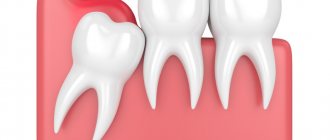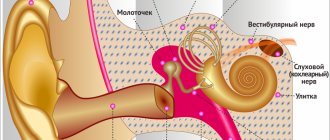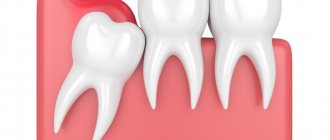They're looking in the wrong place
“For such patients there are special pain clinics, where treatment is individually selected,” says Emil Isagulyan, a neurosurgeon-algologist at the Institute of Neurosurgery named after. N. N. Burdenko, Ph.D. “They deal only with pain and consider pain as an independent disease.
Unfortunately, we have few such clinics, and doctors are aimed at eliminating the cause of pain. They often perform multiple operations, looking for formations that can put pressure on the nerve and cause pain - scars, adhesions, hernias, fragments of intervertebral discs, consequences of injuries. This anatomical cause is eliminated, but the pain remains. For such patients there is even a special diagnosis - “operated spine syndrome.” In such cases, the matter is not in anatomy, not in eliminating the cause of nerve compression, but in physiology - in the improper functioning of the nervous system. The body's anti-pain system, which normally works well, is depleted, and the pain system is activated. We don’t know why this happens, but we know how to help.” An article on the topic of exercise therapy and the gym. Pain syndromes can be treated without pills. How not to bring things to such agony? The cause may be the painkillers themselves. After watching enough advertising, we ourselves treat headaches without a doctor and get hooked on pills. As a result, the so-called Overuse headache - it is caused by medications. You cannot treat migraines and other pain that appear periodically on your own. This increases the risk of developing severe pain syndrome. “Advertised” medications can be taken for moderate and rare pain. All others should be treated by a doctor.
“If he can’t help either,” continues Emil Isagulyan, “you need to go to a pain clinic. Over the past year they were opened at the Institute. Sklifosovsky and at the First Moscow State Medical University. They are mainly treated with therapeutic methods. We are engaged in pain surgery; people come to us who cannot be helped there. The main method of treatment is electrical stimulation. We implant a special device under the skin with electrodes that are connected to the nerves, spinal cord or brain. Using the remote control, we turn on the stimulator, which sends signals that modulate the functioning of the nerves. As a result, the pain weakens or disappears. First, we install a test stimulator to check whether it helps a particular patient. If all is well, we install a permanent one. The operation is simple, and the device does not limit life.
How does the pill know where it hurts? FAQ about painkillers
Pain occurs in two cases:
- Due to external stimuli that excite nerve cells, and they send a signal to the brain, pain signals come. For example, accidentally touching a hot surface;
- Due to damage or dysfunction of the nerves themselves. In this case, the cells produce substances called prostaglandins, which act on the nerve endings in the body and stimulate them to transmit a signal to the brain about which area hurts and how much it hurts.
Painkillers work by preventing damaged cells from releasing prostaglandins throughout the body, so they always “find” the area that needs to be numbed. Moreover, almost all painkillers only relieve the symptom without affecting the causes of its occurrence. Therefore, if you are experiencing severe pain, be sure to consult a doctor!
How do NSAIDs work?
Nonsteroidal anti-inflammatory drugs (NSAIDs, NSAIDs) inhibit special substances in the body - cyclooxygenases, enzymes that are involved in the production of prostaglandins. An example of an NSAID is Ibuprofen Medisorb. The capsule dosage form allows for faster action.
How do analgesics work? Like NSAIDs, they block the enzyme responsible for the synthesis of prostaglandins and reduce the conduction of pain impulses. Analgesics also increase the sensitivity threshold in the thalamus, which leads to an improvement in dental, joint, and headache pain, and have an antipyretic effect. Examples of non-narcotic analgesics are Paracetamol Medisorb, Analgin Medisorb.
How do antispasmodics work? A spasm is a prolonged painful contraction of a muscle. Antispasmodics affect the sympathetic nervous system and reduce muscle tone.
Examples of antispasmodics are “Drotaverine MS”, “Papaverine hydrochloride MS”.
How do triptans work?
This is a special group of medications for the relief of migraine attacks; they are not suitable for eliminating other types of pain. Triptans reduce nerve sensitivity and neurogenic inflammation, eliminate nausea and photophobia associated with migraine.
Why do cancer patients require narcotic painkillers? When internal organs and tissues are involved in the pathological process, cancer patients may experience severe visceral pain due to tumor growth. At first, patients are prescribed broad-spectrum NSAIDs, but as the disease progresses, their effect to relieve pain becomes insufficient. Then patients are prescribed potent anti-inflammatory analgesics. At the last stage, cancer patients receive narcotic analgesics - opiates. They work by inhibiting the conduction of painful stimuli in the central nervous system.
Important: all painkillers have contraindications! Before use, consult your doctor, always read the instructions for medical use of drugs!
Case histories
Question answer
In what cases should patients be given pain medication? “For 12 years I was tormented by pain in my hip, in the last 2 years it has intensified, nothing helped, I could hardly walk,” says a man in his sixties, walking along the corridor of the department. — The Ministry of Health gave me a referral to the Research Institute of Neurosurgery. First they put in a temporary neurostimulator, and I immediately felt better. The pressure dropped to normal, before it was 180/120. The pain has eased significantly. Now the stimulator is constant, I turn it on when necessary. I take medications much less often.”
In addition to pain, the method can also help with delicate problems. “Three years ago I was diagnosed with an overactive bladder,” says the young woman. — Every 30-40 minutes I had to go to the toilet. I couldn’t leave home for a long time, I couldn’t go to the movies, and riding public transport was a problem. I tried everything - medications, homeopathy, acupuncture, psychotherapy - nothing helped. A year ago they installed a stimulator and life got better.”
The tests are normal, but the pain does not go away. What are the dangers of long-term stress?
I woke up and can't sleep.
Symptoms of Chronic Stress
Anxiety disorders have been known since the time of Hippocrates. Even then, people were mentioned who suddenly felt afraid on a deserted road far from home, who were afraid of cats, etc. The effect of stress on the body began to be studied in detail only in the middle of the 20th century. In some cases, short-term stress (and it can even be a pleasant event) is useful, but chronic nervous tension negatively affects not only a person’s psychological state, but also physical well-being.
Olga Litvinovich:
“A business meeting at work, speaking in front of a large audience, the desire for perfectionism both in business and at home, social upheavals... Any event can become stressful for a person. Someone may reflect that, for example, anxiety and headache appeared after a certain incident. Another person will ignore these thoughts and brush them aside. When we are in a state of prolonged chronic stress and tension, the body begins to signal that it is overloaded and exhausted.” What signs indicate nervous overload?
- insomnia. Including sleep disorders, when a person wakes up around 3 a.m. and cannot fall asleep; - inability to concentrate; - loss of interest in what used to bring joy; - feeling of constant vague anxiety; — pressure surges; - psychogenic pain of various localization (migraine, abdominal pain, etc.).
Olga Litvinovich:
“Accumulated anxiety and stress can become somatized and manifest themselves in the form of a specific pain sensation. It can occur on any part of the body. Some suffer only occasionally, while others suffer from constant pain for months or even years. Moreover, it cannot be measured. We ask the patient to rate the pain themselves on a scale from 0 to 10. Of course, this is subjective and depends on the person's pain threshold and other factors. If the prescribed examinations do not reveal pathologies, then there is a high probability that the pain is psychogenic. In this case, the treatment should be radically different. Conventional painkillers will not have any effect. This requires the prescription of antidepressants (by the way, they can also be prescribed by a neurologist), psychotherapy and lifestyle correction are also desirable. Fortunately, now people, especially young people, do not hesitate to turn to psychologists and psychotherapists. In cases of unclear anxiety and fear, as a rule, people come for psychological help themselves. People with pain most often go to a therapist. And after going through many examinations, they end up seeing a neurologist. Treatment with antidepressants helps adjust pain centers and improve the functioning of neurotransmitters. You need to take antidepressants for a long time, several months. The effect occurs in 2-3 weeks. Modern treatment protocols are safe and do not cause addiction or weight gain.” Pain from... painkillers
There is a category of patients who harm themselves with their own forethought. For example, they take painkillers “just in case,” even when nothing hurts.
Olga Litvinovich:
“Most often women are guilty of this. Knowing that they have headaches, for example, they take pills so as not to “spoil their day.” This behavior is dangerous. Uncontrolled use of painkillers (for 15 days or more) can itself cause pain. It turns out to be a vicious circle.” How else is self-medication dangerous?
— the gastrointestinal tract suffers from the abuse of painkillers.
This threatens the occurrence of gastritis, ulcers, gastrointestinal bleeding; - Alcohol-based sedatives can be addictive like drugs. Psychogenic pain.
Is a doctor required? If at first you can cope with psychogenic pain on your own by adjusting your lifestyle, then chronic pain will not go away without the help of a specialist.
Olga Litvinovich:
“If the pain lasts longer than 3 months, it is considered chronic. If pain persists for more than one year, then even with treatment, the effectiveness of medical care decreases. After 5 years of living with psychogenic pain, it is almost impossible to cope with it, even with medication. You should understand that you need to get ready not only to take pills, but also to completely change your lifestyle and master the skill of mental hygiene.” What is important in the treatment of psychogenic pain (and for its prevention)?
— establish proper sleep; - eat a balanced diet; - move. And don’t force yourself to go to workouts you hate, but do what you really like; - be in the fresh air. At least a half-hour walk every day will help relieve accumulated tension and improve your psychological state; - shift focus to positive aspects. Sometimes this is difficult to do, but the brain must be consciously switched to searching for the good. In the USA, they even created a special radio for these purposes, where only good news is told; — limit the flow of negative messages. When a person reads or watches something bad on video, the psyche works in such a way that he begins to try the situation on himself, thereby exposing the body to additional stress; - protect yourself from a toxic environment; - seek help from specialists. It is impossible to thoroughly understand everything. Sometimes the situation seems hopeless, but for a professional it can be an understandable case that can be easily dealt with instead of suffering from insomnia or pain for years.
Focusing on the positive and taking time for yourself and your condition is not selfish. Only a fulfilled person can communicate productively in society and be useful to others. Sometimes medical attention is needed to help the body cope with stress. In case of increased anxiety and psychogenic pain, the timeliness of seeking it plays a significant role.
Is it necessary to endure pain?
Pain is a peculiar reaction of the human body to any irritant, an opportunity to convey to a person that there are some health problems. Trying to eliminate pain with the help of painkillers, people can improve their condition for a while, but the cause that led to the pain syndrome often remains unidentified, and after a while it can remind itself again.
Many studies have proven that attempts to endure pain have an extremely negative effect on the human body, as nerve cells in the brain die. Few people know that constantly ignoring pain can lead to various cardiovascular pathologies, decreased immunity, dystonia, and so on.
But there is also no need to abuse pills at the slightest manifestation of pain, since much more harm to the body can be done than good.
Research in the field of neurology and psychiatry shows that abuse of non-steroidal painkillers over a long period of time can lead to the development of hypertension, the appearance of internal and external edema, renal failure, as well as the development of a heart attack or stroke.
Some types of painkillers can negatively affect the digestive organs, causing the development of ulcers, gastritis, erosion, etc.
Long-term use of painkillers can worsen vision, causing the mucous membrane of the eye to dry out.
Some painkillers help thicken the blood and can cause blood clots to form and, as a result, blockage of blood vessels. The outcome in such cases is unfavorable; diabetes mellitus, thrombophlebitis, atherosclerosis, varicose veins, and so on may develop.
Excessive use of analgesics can disrupt the functioning of the liver, and there will be a gradual accumulation of toxins in the body, because the organ can no longer perform its job fully. The result of slagging can be various dermatoses, skin rashes, allergic rashes, etc.
Prevention
These rules should be followed by all people who experience pain in the left lower abdomen:
- control your stress and its level. To do this, you should meditate and do stretching exercises. Very often, stomach problems arise due to stress. Stretching, meditation will relax the body, mind, reduce pain in the left abdomen;
- Exercise regularly if your stomach hurts on the lower right side. Thanks to constant exercise, constipation is prevented and metabolism is accelerated. In addition, sport helps strengthen the digestive tract, cleanse the intestines, and ensure efficient functioning of the stomach;
- fill out a food diary. Write down all the dishes you ate throughout the day there. This will help you understand why your stomach hurts. You can prescribe your diet for a week, and it is important to indicate even the amount of food consumed. You should also write down your feelings during abdominal pain in your diary (the nature of the pain, their duration);
- watch your weight. Just because you're overweight and not much of it, doesn't mean you can forget about heartburn. Scientists say that the layer of fat puts pressure on the stomach, causing gastric juice to rise into the esophagus, and this guarantees heartburn;
- drink more water if your stomach hurts (about 2.2 liters). To have regular bowel movements and digest food, you need to drink enough liquid. Otherwise, hemorrhoids, polyps, and painful constipation are possible;
- get plenty of rest. If there is a stomach virus in the body, then you should be at peace and have strength. In the case of acid reflux, lack of adequate sleep can lead to serious consequences.
Clinical manifestations
Once it occurs, the pain syndrome provoked by metastases is moderate in nature. It intensifies after physical activity or at night.
As the tumor process develops, the symptoms also intensify. The pain syndrome becomes pronounced and painful.
There are other “signals” indicating the presence of bone metastases:
- Spinal cord compression. It happens quite rarely, but it makes life quite difficult. The thoracic spine or the lumbar and cervical sections are subject to compression.
- Hypercalcemia. The level of calcium in the blood increases, which ultimately leads to a malfunction of many body systems. The complication is very common.
- Pathological fractures. The femur in the area of the diaphysis or neck often suffers.
Patients with late stages of cancer also exhibit symptoms such as:
- Temperature increase;
- Exhaustion;
- Weakness, etc.
Why don't painkillers help?
Such pain affects brain function. It creates its own independent “image” - a group of neurons in which excitation is endlessly maintained even when the source of pain disappears and impulses from the damaged area stop. Long-term pain becomes a “thing in itself”: it may not depend on the strength of the stimulus and may not respond to painkillers. There are headaches, pelvic pain, inexplicable pain in the limbs and, finally, pain without a clear localization that seems to wander throughout the body - they are united by the fact that the patient feels absolutely powerless in front of them. Sometimes it turns out that survey data also does not help to find the source of suffering.
There are unobvious reasons that can increase pain and even become its cause. Here are the most common ones.
Depression
Depression is present in 30–40% of people with chronic pain. The reasons lie in the common mechanism of occurrence of the two ailments, an imbalance of serotonin and norepinephrine in the brain.
Experiments have shown that if subjects read texts with pessimistic content, their resistance to the effects of cold decreases. Conversely, optimistic stories that helped improve the mood of the subjects improved their tolerance to low temperatures. An analysis of the subjects' reactions showed that the difference in the perception of cold was associated exclusively with a behavioral reaction. That is, the body did not activate additional thermal reserves in optimistic people. The subjects simply convinced themselves that they were not cold at all. And this happened without the participation of conscious mechanisms. In the same way, the brain is able to convince itself that it is in pain, and its owner will not even suspect that some psychological mechanisms are involved.
How to treat?
Conventional pain medications are rarely effective in cases of a combination of chronic pain and depression. But antidepressants in combination with psychotherapy give excellent results. These drugs are supposed to act in two ways: they reduce anxiety and depression, which cause the patient to give up hope of a cure and focus on pain and its smallest nuances, and also directly suppress the central mechanisms of pain. A neurologist can diagnose the connection between depression and pain and prescribe treatment.
Anxiety
Anxiety has an ambiguous effect on the perception of pain. Studies have shown that if a patient is very worried about possible pain in the preoperative period, he is likely to experience significant discomfort after surgery. Anxiety with a focus on possible pain produces maximum pain in the future. However, if the patient is worried about something not related to pain, he will feel virtually no discomfort in the postoperative period.
How to treat?
Anxiety and depression are often related and are different “faces” of the same problem. Therefore, antidepressants are quite effective here too. Cognitive behavioral therapy is also used, when the patient learns to control the manifestations of anxiety, analyze their behavior and prevent the emergence of habitual patterns that trigger the “panic button” in the brain.
"Painful Family"
Research has revealed a pattern: patients with chronic pain often come from “painful families,” in which one or more relatives were seriously ill and were accustomed to physical suffering. It turns out that this experience is passed on along with family sayings, traditions and behavior in difficult situations. Younger family members seem to learn to live with pain without actually experiencing pain. Events develop in a similar way for a child who has experienced violence. A stressful situation can unwind the spring of an incorrect life scenario and put it into action. A person begins to feel pain, but doctors do not find any objective reasons for suffering.
How to treat?
Psychotherapy. It's a long, winding and difficult road. But, alas, it is the only one that helps to rebuild a healthy personality from a “sick person.”
Personality Features
We know that pain can change a patient. Transform him from the eternal soul of the company, a joyful joker, into a gloomy misanthrope. However, personality also influences pain. Ambitious, executive, ambitious and secretive people often suffer from migraines. Researchers note that such people tend not to show their suffering, preferring either to remain silent or to look for “socially acceptable” ways of expressing negative feelings. For example, reprimand a subordinate for a real or imaginary offense. Or quarrel with your spouse out of the blue.
How to treat?
The psyche and the perception of pain are closely related. Does this mean that if you change your character, there is a chance to recover from chronic pain? Yes and no: personality traits are largely determined genetically. This means that it is almost impossible to make an extrovert out of an introvert. And yet, you can change some “non-working” attitudes in your own worldview. Then there is a chance to influence the pain that cannot be tamed with medications.
It is assumed that extroverts, on average, tolerate pain more easily than introverts. The latter prefer to be in silence and solitude, which contributes to excessive concentration on pain. However, there are exceptions to this observation - meditators. People who seek solitude, but learn to observe their pain and associated emotions from the outside, cope effectively with suffering. Therefore, training in a variety of mindfulness techniques, yoga and meditation can also be considered effective strategies for dealing with chronic pain.
Pain is a complicated thing. It is not at all like the red ball from the advertisement, which wanders around the body, and then meets the blue pill and immediately disappears. Painkillers do not always work, and sometimes they themselves become the cause of pain - this often happens when analgesics are abused. Chronic pain will not disappear with the wave of a magic wand. To cure it, the joint efforts of the patient and the doctor will be needed: selection of medications, adherence to a certain diet and physical activity, training in relaxation and mindfulness methods.
Primary tumors
Primary occurrence of bone cancer is rare. Among such diseases are sarcomas. The primary lesion can be caused by active growth of bone tissue, this occurs in people under the age of twenty.
Symptoms of the primary disease:
- Pain in the focal area. At first, the pain syndrome is mild or moderate. He may disappear, but then appears again. At later stages it is constant and pronounced.
- General symptoms that are characteristic of any cancer disease, for example, weight loss, weakness, etc.
- Manifestations characteristic of bone damage - lameness, pathological fractures, etc.
Primary and secondary diseases are united by a number of manifestations, which is why in making a diagnosis you should not rely only on the patient’s complaints. Diagnostics required.











